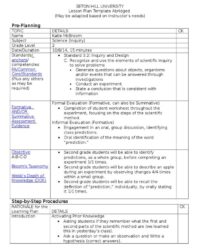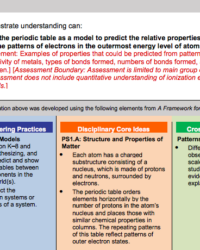Have you ever wondered how to really light a spark in your students, moving beyond just memorizing facts to genuinely exploring and understanding the world around them? Inquiry based learning is a powerful approach that shifts the focus from teachers delivering information to students actively seeking answers. It’s all about curiosity, asking big questions, and diving deep into investigations, making learning incredibly engaging and meaningful.
While the idea of fostering student-driven inquiry is exciting, it can sometimes feel a bit daunting to implement effectively in a structured classroom environment. How do you guide exploration without losing direction? That’s where a well-crafted inquiry based learning lesson plan template becomes your best friend. It provides the framework you need to facilitate discovery, ensuring that curiosity leads to genuine understanding and skill development.
Unpacking the Core Components of an Effective Inquiry Based Learning Lesson Plan Template
Inquiry based learning isn’t just about letting students do whatever they want; it’s a carefully guided process where students construct their own understanding through investigation and problem-solving. This approach thrives on student-generated questions, critical thinking, and collaborative discovery. Without a clear plan, however, lessons can quickly lose focus, making it challenging for both students and teachers to track progress and learning outcomes. A robust template acts as a roadmap, ensuring that even the most open-ended explorations are purposeful.
The beauty of a structured inquiry based learning lesson plan template is that it allows for flexibility within a defined framework. It helps educators articulate the learning objectives, anticipate potential student questions, and design experiences that truly empower learners to take ownership of their education. From identifying essential questions to planning for assessment, each component plays a vital role in scaffolding the learning journey.
Crafting Compelling Essential Questions
At the heart of every successful inquiry-based lesson are essential questions. These aren’t simple, fact-based queries but rather open-ended, thought-provoking questions that spark curiosity and demand deeper investigation. They should be timeless, debatable, and transferable, connecting to broader concepts rather than just isolated topics. For example, instead of asking "What is photosynthesis?" an essential question might be "How do living things obtain and use energy?" The latter invites exploration, research, and critical thinking, driving the entire inquiry process. When designing your inquiry based learning lesson plan template, dedicating significant space to developing these questions is paramount.
Designing Engaging Learning Experiences
Once essential questions are established, the next step involves mapping out the learning experiences that will help students explore those questions. This is where you think about the ‘how’ of the inquiry. What activities will students engage in? Will they conduct experiments, analyze data, read various texts, interview experts, or undertake field studies? The goal is to provide a rich array of resources and opportunities for students to gather information, test hypotheses, and construct their understanding. Remember, the teacher’s role here shifts from being the sole provider of information to being a facilitator, a guide who supports students in their investigative journey. Providing choice and opportunities for collaboration within these experiences can significantly boost student engagement and motivation.
Practical Steps to Implementing Your Inquiry Based Learning Lesson Plan Template
Bringing an inquiry based learning lesson plan template to life in the classroom requires more than just filling out sections; it demands a shift in pedagogical approach. It’s about cultivating an environment where questioning is celebrated, mistakes are seen as learning opportunities, and every student feels empowered to pursue their own lines of inquiry. This means being responsive to student needs and interests, even if it means veering slightly from the initial plan, as long as the core essential questions remain the guide.
One of the critical aspects of implementation is how you structure the learning cycle. While there are many models, most inquiry processes involve phases like "hook" (engaging students), "explore" (allowing hands-on investigation), "explain" (students share findings), "elaborate" (deepening understanding), and "evaluate" (assessing learning). Incorporating these phases into your template ensures a comprehensive and coherent learning experience. It also provides a clear structure for students, helping them navigate the inquiry process effectively.
When it comes to assessing inquiry-based learning, traditional tests often fall short. Instead, focus on authentic assessments that allow students to demonstrate their understanding through projects, presentations, debates, or written reflections. Rubrics can be incredibly helpful here, detailing expectations not just for the final product, but also for the process of inquiry itself – things like critical thinking, collaboration, research skills, and problem-solving.
- Define Clear Learning Targets: What knowledge and skills do you want students to develop through the inquiry?
- Anticipate Student Questions: Think about common misconceptions or tangents students might explore.
- Curate Diverse Resources: Provide a variety of texts, tools, and materials for investigation.
- Plan for Formative Check-ins: Regularly monitor student progress and provide feedback.
- Design Authentic Assessment Tasks: Allow students to showcase their understanding in meaningful ways.
- Allocate Time for Reflection: Encourage students to think about what they learned and how they learned it.
Embracing an inquiry based learning lesson plan template can truly transform your classroom into a vibrant hub of exploration and discovery. It allows educators to move beyond traditional teaching methods, fostering a dynamic environment where students are not just passive recipients of knowledge but active constructors of it. The skills developed through inquiry, such as critical thinking, problem-solving, and collaboration, are invaluable for lifelong learning and success in an ever-changing world.
By systematically planning your inquiry units, you provide the necessary structure for students to flourish in their independent investigations. This thoughtful preparation empowers them to ask profound questions, pursue meaningful answers, and ultimately, build a deeper and more lasting understanding of the world around them. It’s a journey well worth embarking on for both educators and learners alike.

